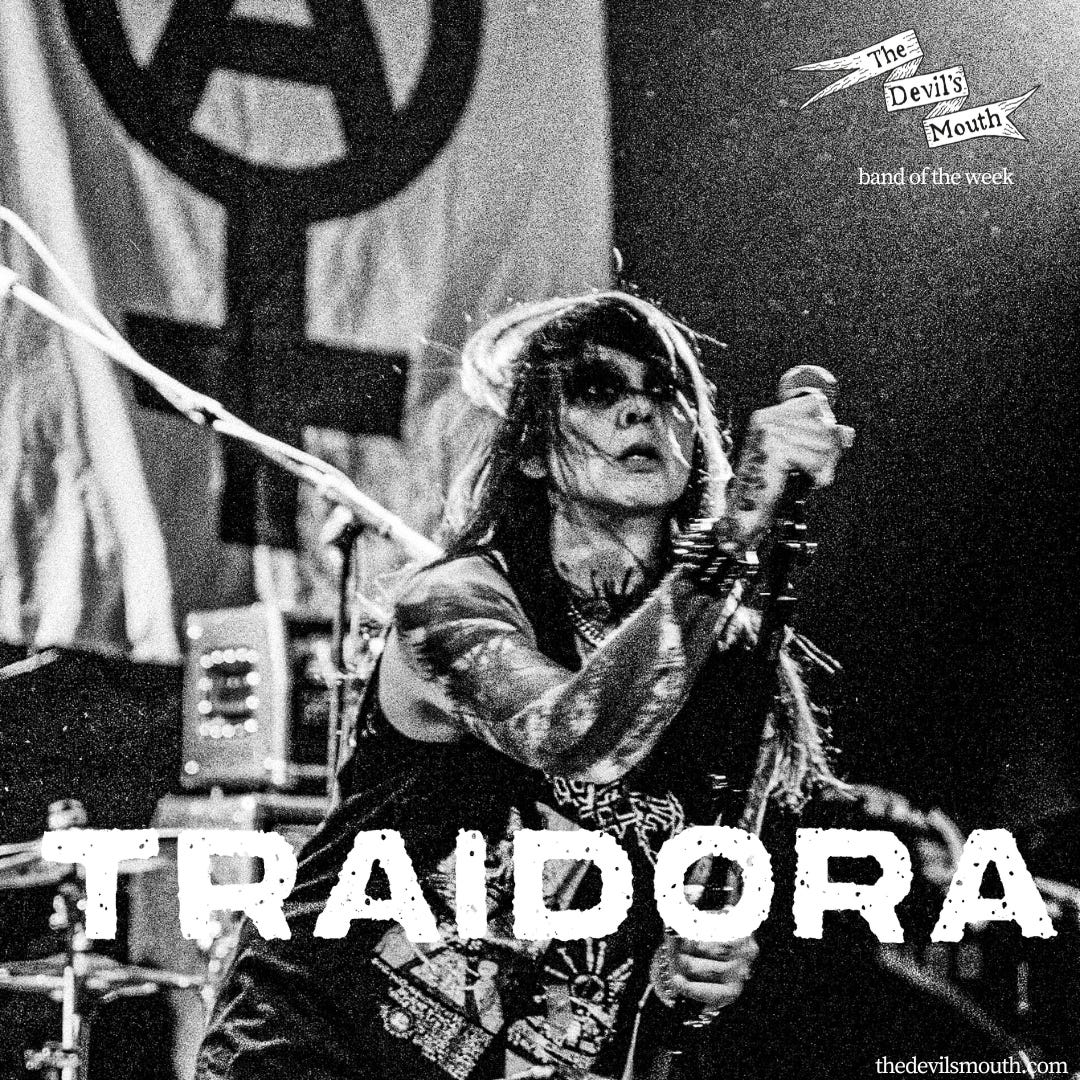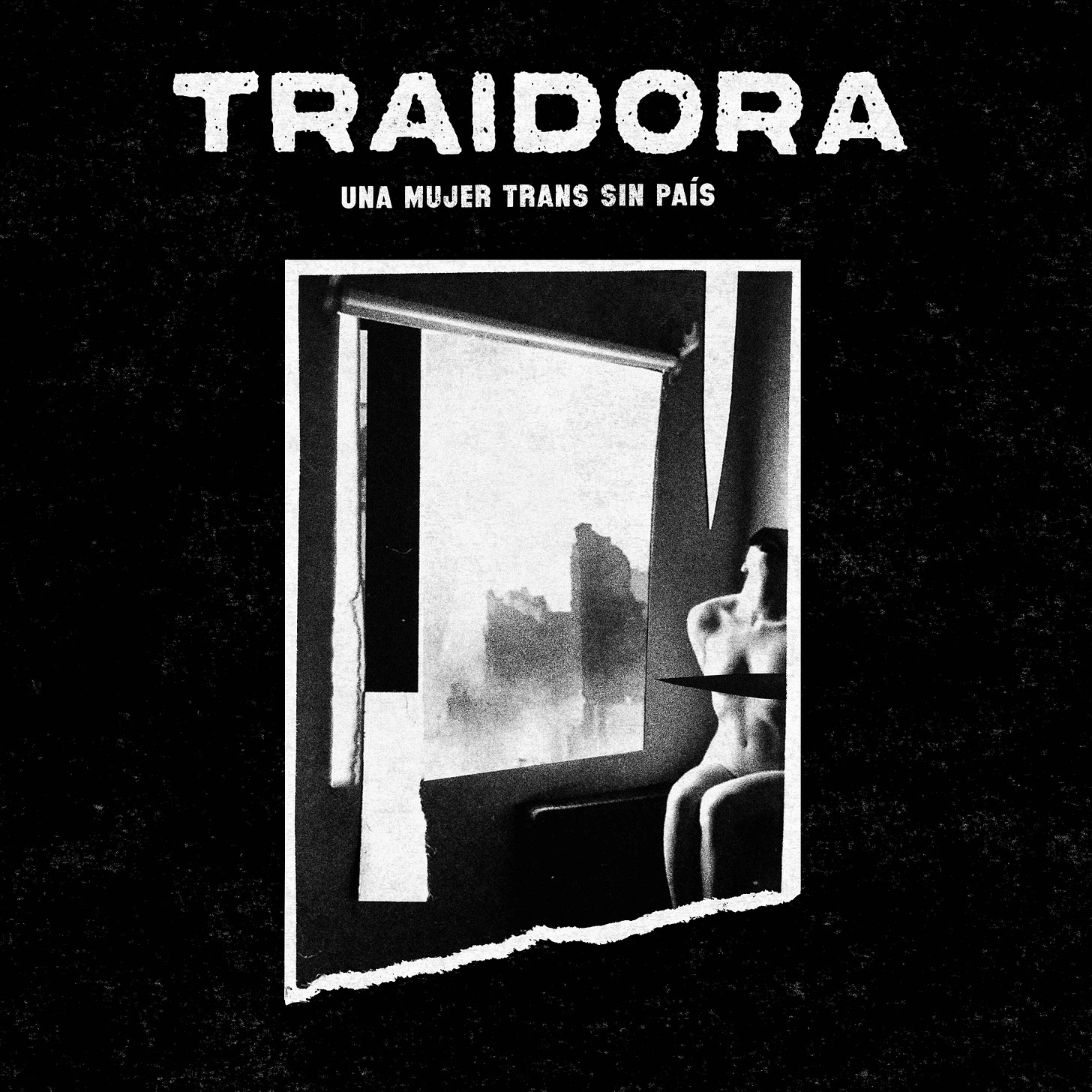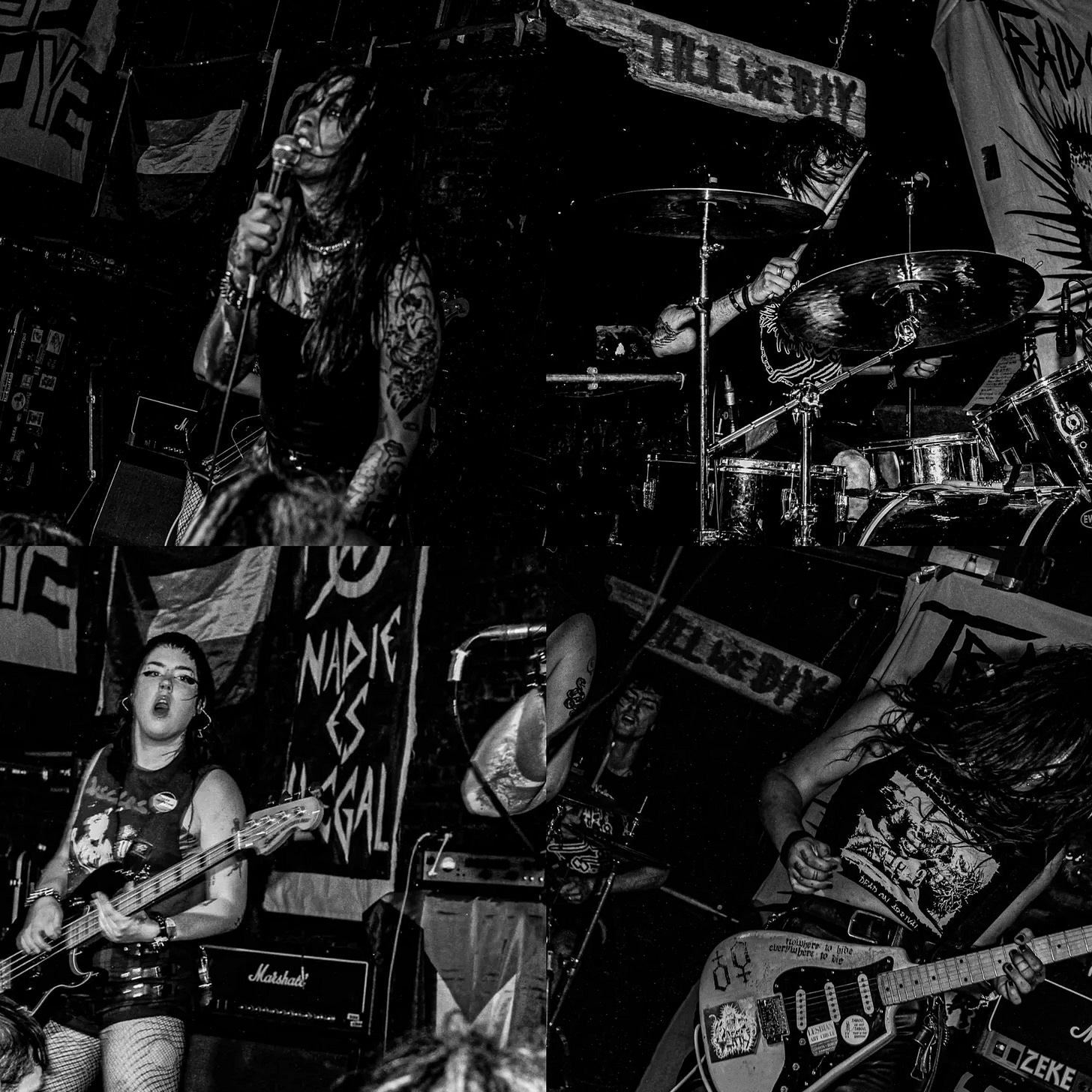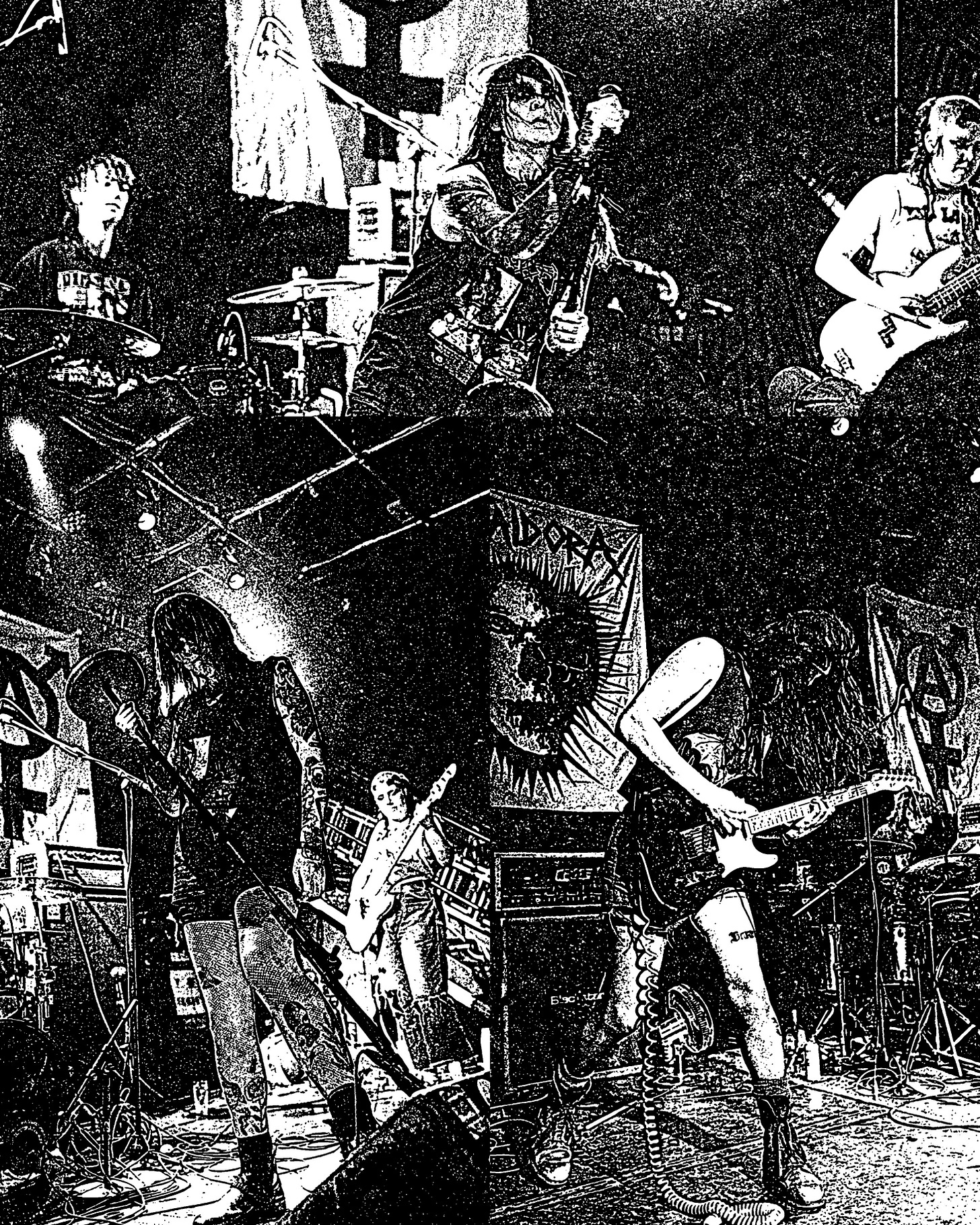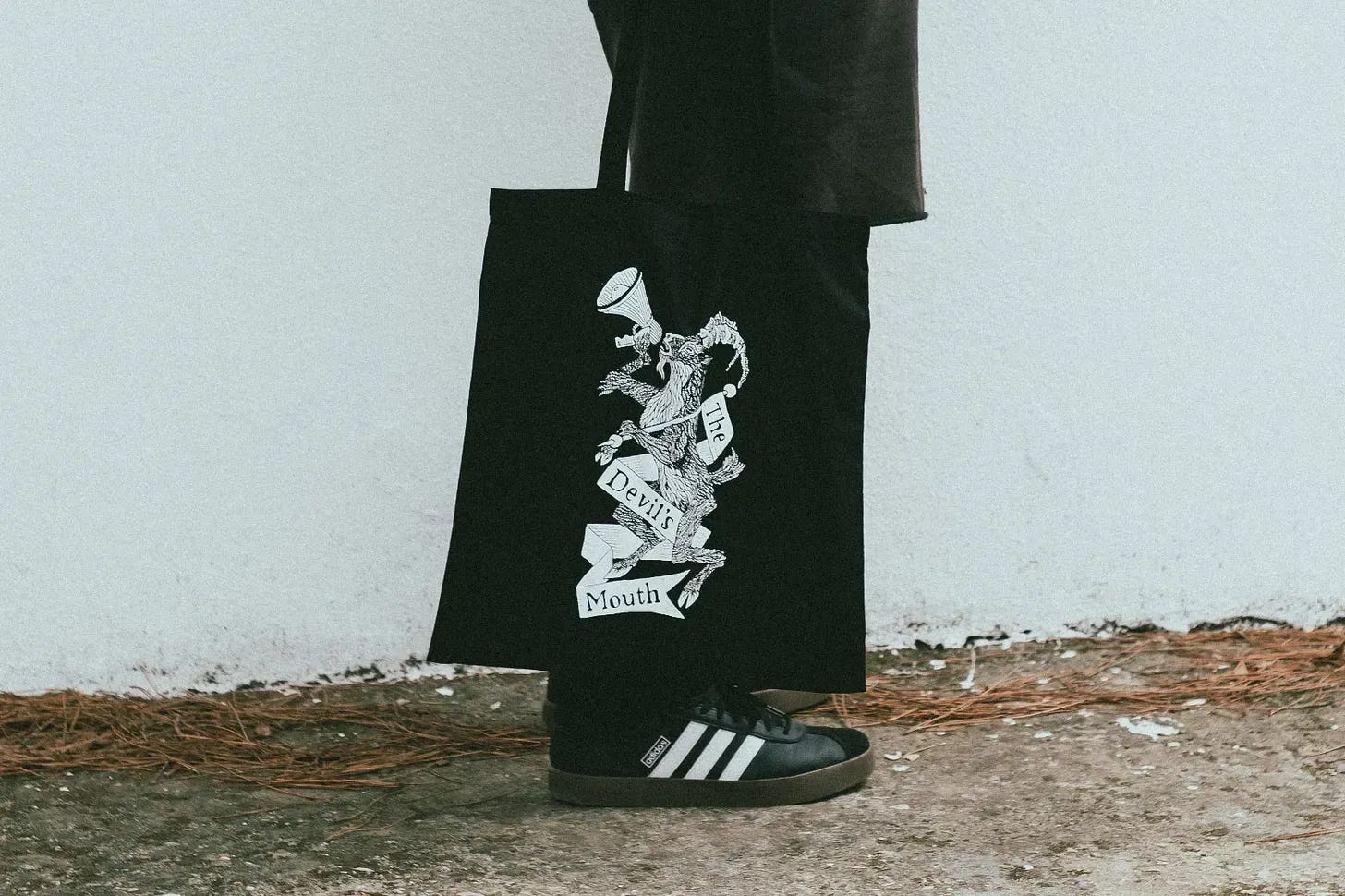BAND OF THE WEEK: Traidora
The angriest, most ruthless raw punk you'll listen to this year.
No matter how much empathy you feel - which is not to say empathy is not important, crucial even, because it is -, there is still a difference between being sensitive to someone else’s struggles and actually going through them. A difference that typically comes out in art. See, Traidora is led by Eva Leblanc, a Venezuelan-born trans-woman immigrant living in the UK. She knows what it is to be discriminated against, oppressed and denied her very right to exist, and the music she makes through Traidora - which started as a solo project but is now an actual four-piece band feature three other queer people - doesn’t pull any fucking punches in regards to those struggles. The debut full-length album which is out today is heavily influenced by legendary Latin American punk bands like Masacre 68 or Los Crudos and it is the most direct kick-in-the-face, raw and truly hateful slab of crude hardcore punk that you will hear this year, and probably for many years. Just like our Andy has kinda predicted with his review of the advance single on the latest The Devil’s Month feature. Lesson: always listen to Andy.
Anyway, as its title suggests, ‘Una Mujer Trans Sin País’ (“a trans woman without a country”) is as no-bullshit lyrically as it is musically. With the passion and downright fury helped by expressing herself in her mother language, Eva sings about morality, gender, borders, Palestine or local Mapuche struggles with a conviction that will damn well make you sit up and take notice whether you want it or not. If you don’t know Spanish, your brain will fucking become fluent by force at least during the eighteen and a half minutes these thirteen songs will pummel you for. Now, enough talking about it to ourselves - time to listen to the thing, and pass the word on to Eva herself, through the interview she was kind enough to be available for which you can read below. Thank you, Eva!
‘Una Mujer Trans Sin País’ is out now via La Vida Es Un Mus.
You can find Traidora on Bandcamp and Instagram.
“I like to think the band helps trans people being given more of a chance at having a platform in the punk community, because we are sometimes pushed back. There’s a lot of festivals where there not any trans or queer bands, and I’m like, hey, we’re here.“
— Eva Leblanc
So Traidora originated as your solo project, and has since evolved into a band. Would you like to guide us through these first years that lead to where we are now, with the release of this album?
Eva Leblanc: Yeah, Traidora started as a solo project of myself. My plan was to do a one-woman band. That made sense at the time, you know, I thought I would play live, not acoustic, but with distortion, playing a guitar, heavy, with backing tracks. I have always wanted to do a project like this. I didn’t have the chance to do it because of time, life, troubles. So, two years ago, I decided, okay, I need to start working on this because I found it was really necessary to start something like Traidora, both for myself and also in general for the audience, the punk community, because there was a lack of queer, trans, Spanish-speaking punk bands talking about these topics, and about migrants as well. So, yeah, I just started with this. Actually yesterday I found the first demo I kind of recorded in March 2023. This was me with a little audio interface, actually this I have right here [she holds up a Focusrite Scarlett 2i2], the classic one, everyone who started recording music at home has used that one. [laughs] I didn’t even know how to use it properly, so it was like a really basic recording. I started recording with no amps. I just plugged in the guitar turned on my laptop, and recorded all the guitar and the bass. Also, I learned how to use drum machine software on my laptop as well. It was good for getting to know how to use all of this stuff properly. At one point, I felt like it was time to invite people to make it a band like it is now, but I wasn’t in a rush. I just thought like, well, if people just show up, it will happen at some point, but it’s happened really quickly, actually. And that’s it - the beginning was a one woman punk band talking about really specific topics in the lyrics, and it grew from there.
The album title says it all, right? The core of the band seems to be to deal with questions of identity, of your own trajectory, of trans people, migrants…
Eva: Yeah, definitely. Definitely. It’s a really important part of the band. I would say every lyric is coming from that perspective or that kind of point of view. I’m being really explicit about what I’m talking about. Most of the lyrics, I wrote about trans life or living as a trans woman, a migrant trans woman in another country. They are really explicit about what I want to say. Though I think that is not the only main topic of it, of the band, but I would say it is the most important. Probably 80% of what I write is about being a trans person. From my perspective, and everything I lived in the past, basically.
I really like that approach, how clear and direct you are in the way that you write. It’s a great example of how to tackle important things without fear and without bullshit - which sometimes is lacking, I find.
Eva: Yeah, thank you! I think this way to say stuff really straight is just how I grew up, basically. Probably it’s the way people grew up all over South America. I’m not saying it’s like a stereotype, but in general, in my family, in my group of friends, I grew up being really honest. It’s like, do you like this? No. Do you like that? Yeah. No one minces words. And that’s okay. In different cultures, it’s a bit different, of course. It might change in different parts of the planet. I have to say that I also try to take a lot of inspiration from Latin American punk bands, like Los Crudos. It’s one of my favorite bands.
They are such reference. For everything!
Eva: The first band I saw live, you know? When I was twelve or thirteen years old. Yeah, it was like the first DIY punk I listened to in my life as well. So I think I grew up with those references very present. I listened a lot to Los Crudos or stuff on La Polla Records, also Fun People from Argentina. Their lyrics were also very straightforward, when they screamed strong words, like “asesinos!”, that was really clear. So I wanted to put that element in the band. Especially with this type of topics that we deal with, I understand it can be a bit difficult to talk to someone who is not trans or someone who is not queer, and I think being straightforward helps a bit to spread the message to everyone.
Yeah. And now that you’ve mentioned that, there is actually a bit here in the bio on the press release that made me think - where it says that, and I quote, you are “bringing an uncompromising political hardcore punk to the stage against a lot both the receptive and not so receptive audiences.” So, you’ve had experiences playing live where the audience wasn’t entirely on your side, so to speak? Have you had confrontational shows?
Eva: Oh yeah, definitely. I have. One main situation happened in London, where people were being transphobic and xenophobic, though not directly to us in person. There was a gig in March where there was a fight during the gig, I’m not going to go into the full details of it, but it was in the mosh pit, people were dancing, and something happened. Some guy was like, okay, let’s go and take the fight outside. So I just went there, I wanted to see what was happening, and I saw one of those guys screaming, a hardcore boy screaming to another punk boy, calling him a faggot. And someone was making a joke of his nationality because he was from somewhere else in Europe, in a very xenophobic way. My group of friends I was with was mostly queer, so my partner and everyone else went to confront this hardcore guy, asking him why he was screaming faggot like that? “You have any problem with faggots?" we asked him. Because if you do, you have a problem with us. We confronted him and warned him to never say those things again. It was a really stressful situation, because on top of it, it happened during a hardcore punk hardcore festival, one of the most like popular ones in London, that is supposed to be a safe space. Someone from the production was involved too, and at one point, it was a bit like, what are we doing here?
We get so much of that shit in normal life, so to speak, and in a space like that, it’s even more shocking in a way.
Eva: Yeah. It’s become normalized. Online we have had a couple of situations where people have replied to my comments or commenting on my girlfriend’s profile saying stuff like calling us faggots, and saying I am just a man wearing skirts, stuff like that. So, yeah, there has been some situations where we were not very welcome, and it’s been really annoying. But at the same time, it also gave us a lot of support from a broad community as well. This kind of stuff gave us the chance to speak more about this and explain online what happened and say to people what is our stance about this when these situations are happening. At the same time, when we speak out in a really straightforward way, about the things that we don’t like, a lot of people feel supported by us in some way. If you will come to a Traidora gig, you will feel that you will be safe. You can talk to us. You can come to the door if there is any problem, like an attack or someone being homophobic, transphobic, xenophobic with you. I think there’s the message of the band as well. My lyrics are really straightforward, but also how we show the band on stage, we’re using banners in the back with Spanish sentences, anarchist symbols, the Palestine flag and stuff like that.
I do love that you’ve kept the Spanish and your Latin American identity. I suppose there can be a temptation of singing in English, trying to, I don’t know, be more understood or whatever.
Eva: Yeah, I play in a band just before Traidora in 2022. I played for a few months with them, but I was just replacing the singer, basically. The singer left and they asked me if I wanted to sing on it. And the lyrics were in English. It was good, a good experience, you know, but I didn’t feel comfortable doing that, in the end. I felt I couldn’t express myself properly. I couldn’t feel like the words coming out from my mouth were real. It’s a really different problem to write in English. I can write emails and basic stuff, but if I want to write something like a song, it’s quite hard because it’s just different ways of thinking. Los Crudos and Limp Wrist was quite the main reference for Traidora and for me in that aspect, from the start I wanted to do something queer, explicit, gay, but singing in Spanish. So I kind of like melt both ideas. I want to express myself in as much a natural way as I can, but yeah, at the same time, I understand it could alienate some people reading our lyrics, reading our banners. So what I did is I created like a fanzine, like a little flyer. Basically, it’s all the lyrics, and we give this out at every gig at the end. Many times people approach to me at the end of the gig like, oh, I really love your band. But I don’t understand what you say. So this helps.
That’s great. If you would have an online version of that, that would be super useful too, especially now with the attention you’ll get with the new album.
Eva: Yeah, we’re doing that. I’m working on another one right now, because we’re going to Spain on tour in October. I should also say that on the new album, the insert has the lyrics both in Spanish and English too.
Was it difficult to translate all the intensity and the anger of your live shows on to a studio recording? Did you feel any barriers in that process?
Eva: It was really easy, to be honest. We record with Wayne Adams [the lovely Wayne who has been on The Devil’s Mouth podcast before - check it out], I worked on my first EP with him as well, he helped me a lot on that recording. So I already knew the studio this time, and I knew him, I really have had a good experience with him. In November last year, we played with his band Petbrick in London, which was the first time he saw the band play, like a proper band. So he approached me, and told me that if I wanted to record, we should do it again. I was actually looking for a studio to record at the time, and we booked it in three days. It was very easy. It was a natural process because we have played a lot as a band, we’ve done a lot of gigs with a full lineup. So when we git to the point to record, we had a lot of practice. We experimented a lot with the sound, with the tone of the guitar, with the tone of the bass, during our show, so when we went to record, we knew exactly what we wanted. I remember the first day - we actually recorded all the instruments for the album in one day.
Wow!
Eva: And it was all recorded live, except for the vocals. So yeah. In one day we recorded everything live, playing all together. We know each other really well by now, how we sound. All of us know the songs really well. Then the next day I recorded vocals with a bit of mixing. The last day we finished all the mixing on it. The mastering was then done by Wayne as well. But yeah, it was really smooth. I feel at home being in a recording studio, even if I don’t know how everything works yet. [laughs]
That’s exactly how the album feels like the album feels, like you’re here in the room playing in my face. I love when a recording sounds so spontaneous like that. Are you fully satisfied with it now that it’s out of your hands?
Eva: I mean, there’s always some bits you would change, you know. I think if you talk with any punk band or any person who records music and releases it, there’s always something. Maybe I should have put this a bit more louder or change this part, change this lyric. But, you know, I don’t want to focus on that stuff. I’m really happy to have made this record. It’s kind of a cliche, but it does feel like I was working on this record all my life. I’m really happy about how it sounds, how the lyrics fit in the music, I even like the the order of the songs. I think it sounds really organic.
I know it’s early, but have you had feedback from people, maybe people who felt, as you said before, connected to the lyrics and the message of the band? Do you feel that you’re helping, with what you’re doing, the several communities that are connected to the band?
Eva: Well, I hope I’m helping someone to not feel so bad about their life, or feel connected with the songs. I hope someone feels they love a song because they like the lyric and feel connected with it. For me, it’s super cool. Although I don’t feel that’s how I approach music, with that idea specifically in mind. I just want to say what I want to say. If someone catches it and likes it, then that’s great. I like to think the band helps trans people being given more of a chance at having a platform in the punk community, because we are sometimes pushed back. There’s a lot of festivals where there not any trans or queer bands, and I’m like, hey, we’re here. You know what I mean? This is a chance to make our network of queer bands grow, and feel more connected between us. Which already happened with the first EP, to a certain extent. When I put out the EP, a lot of trans or queer promoters around the UK, even some in Europe, started to contact me because they found a new queer punk band. There were not many of them two or three years ago. Doing the music we do, while explicitly being a trans woman. So I think the connection with other bands is important for us, the connection with other communities, and of course, the connection with people who come to our shows.
So what are your plans now? As you said, you kind of had your whole life to write this record. What are you thinking about doing now? Have you worked on new Traidora songs already, are you thinking of more releases, or even other projects?
Eva: First of all, I have to say I really appreciate what Paco [of La Vida Es Un Mus] is doing with the band. I can’t believe it. It’s one of biggest and most important DIY labels at the moment, and it’s amazing to be a part of it. But yeah, for the moment, I’m focused on putting the record out, showing it to people, who will hopefully like it. And then we’re going to Spain for eight days. We’re doing eight gigs in eight days, we start on the 10th of October in Barcelona. That’s really something I’m looking forward because, well, Spain, you know, the language. But also we’re going to be involved with a lot of queer anarchist collectives working over there. We’re probably going to play in a few social centers, a few squats. Also, we’re going to play in cities that are not like main capitals and stuff. That’s important for me to do with this band. I want to go and play in a small town in a squat with a cheap ticket, share it with people. I think we’re going to have some talks as well, some meetings during the tour with some collectives over there. So that’s really what I’m looking forward to. Then we have the record release show in London on the 25th of October, after that we have a gig in Berlin in November, and then we’re going to do the South West Coast in England, Cornwall, for four days in November as well. Of course, we’re working on new songs. That’s what I’m doing now after this chat, that’s what I’m going to do with my friends. We have one new song for now, but I’m working by myself on new songs as well. We’ll try to play a lot, as much as we can. So yeah, I’m just thinking about Traidora for now, even if I do play in another band. I’m busy!
Which band is that, if you don’t mind saying?
Eva: I play in a band called Dead Name. It’s also a queer band, but more noisy, compared to Traidora. I also have another project, I work with Eve Libertine from Crass. We’ve been doing some stuff, we played last year, we did a performance. We played in London and that show was recorded. So we’re going to release a record with her. I’m not sure when [November 25th, via Caliban Sounds - here!]. It’s just me playing guitar, it’s more experimental music, more like drone noise, and she’s speaking and singing. It’s very exciting to work with Eve. This is one of my main references. That’s a different story in my life, how we met, how we did it. Otherwise, yeah, we’ll try to go play in more places with Traidora, maybe a few European festivals. I just want people to listen to this stuff, you know what I mean? The record is also going to be on YouTube for free. If you want to buy it, just order it, but if you want to use any online platform or whatever, do it too. I just want people to listen to it.
Want to help us and the bands we cover keep the lights on, and get an exclusive tote bag to show for it? Become a paid subscriber of TDM and we’ll send you one, free postage worldwide. Also, never miss a post again (‘cause you’ll get ‘em in your inbox) and access our subscriber only posts. You get a free trial if you want to test the waters first too. And of course you can just be a free subscriber forever, sans bag or subscriber only posts, but you’ll get the inbox action anyway. Your call. We love you all the same. Get on it:



